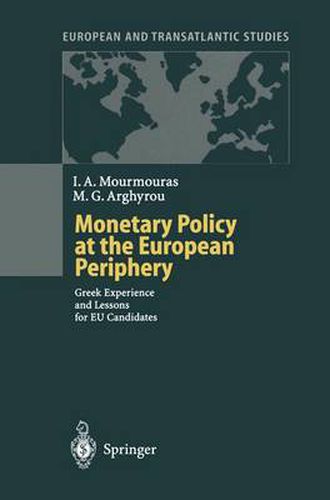Readings Newsletter
Become a Readings Member to make your shopping experience even easier.
Sign in or sign up for free!
You’re not far away from qualifying for FREE standard shipping within Australia
You’ve qualified for FREE standard shipping within Australia
The cart is loading…






This title is printed to order. This book may have been self-published. If so, we cannot guarantee the quality of the content. In the main most books will have gone through the editing process however some may not. We therefore suggest that you be aware of this before ordering this book. If in doubt check either the author or publisher’s details as we are unable to accept any returns unless they are faulty. Please contact us if you have any questions.
At long last, monetary union has dawned in Europe. Eleven member states now share the common currency, forming a larger EMU than many observers, who thought that monetary union would initially be restricted to the core countries of the European Union, expected. The next item on the EMU agenda now is the question how to bring the remaining members of the European Union into the monetary union. I.A. Mourmouras and M. G. Arghyrou address this question from the perspective of Greece, and, with it, future European Union members such as Hungary and Poland. Their book presents a careful and interesting study of the Greek monetary policy experiences over the past 25 years. It demonstrates how Greece moved from an inflation ridden economy characterized by rigid controls of the financial sector to an economy for which an independent central bank and inflation targeting are credible options. The study is not only interesting in itself but also in that it bears important lessons for the development of monetary policy and institutions in the candidate countries of the European Union.
$9.00 standard shipping within Australia
FREE standard shipping within Australia for orders over $100.00
Express & International shipping calculated at checkout
This title is printed to order. This book may have been self-published. If so, we cannot guarantee the quality of the content. In the main most books will have gone through the editing process however some may not. We therefore suggest that you be aware of this before ordering this book. If in doubt check either the author or publisher’s details as we are unable to accept any returns unless they are faulty. Please contact us if you have any questions.
At long last, monetary union has dawned in Europe. Eleven member states now share the common currency, forming a larger EMU than many observers, who thought that monetary union would initially be restricted to the core countries of the European Union, expected. The next item on the EMU agenda now is the question how to bring the remaining members of the European Union into the monetary union. I.A. Mourmouras and M. G. Arghyrou address this question from the perspective of Greece, and, with it, future European Union members such as Hungary and Poland. Their book presents a careful and interesting study of the Greek monetary policy experiences over the past 25 years. It demonstrates how Greece moved from an inflation ridden economy characterized by rigid controls of the financial sector to an economy for which an independent central bank and inflation targeting are credible options. The study is not only interesting in itself but also in that it bears important lessons for the development of monetary policy and institutions in the candidate countries of the European Union.